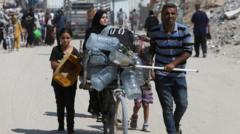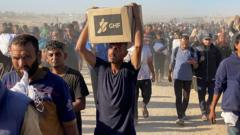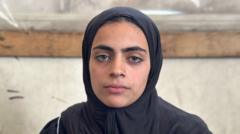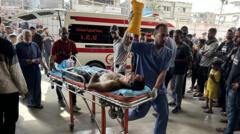The dire conditions in Gaza have turned pregnancy and childbirth into perilous journeys for mothers, with severe malnutrition leading to a sharp rise in complications such as premature births and fetal distress. Overwhelmed hospitals and a lack of basic healthcare complicate the experience, highlighting the urgent need for humanitarian assistance.
Harrowing Reality of Motherhood in Gaza Amid Ongoing Conflict
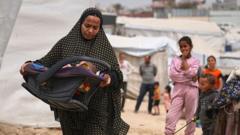
Harrowing Reality of Motherhood in Gaza Amid Ongoing Conflict
As war ravages Gaza, expectant mothers face unprecedented risks, with many fearing for their unborn children’s lives while struggling for basic medical care.
In the besieged region of Gaza, the delicate journey of pregnancy and childbirth has transformed into a harrowing experience characterized by stress and fear. Amidst ongoing conflict, the humanitarian crisis has worsened, endangering not just lives outside the womb but also those within it. The UN has reported alarming statistics, indicating that one in ten newborns is underweight or born prematurely due to acute food shortages exacerbated by the blockade.
Malak Brees, who is currently seven months pregnant, conveyed her fears of giving birth amid the chaos. She recounted her experience of losing amniotic fluid and receiving distressing news from doctors attributing the complications to malnutrition and exhaustion. "They told me it was in the hands of God—the foetus could survive or die," she explained.
The situation is made worse by Israel’s blockade on Gaza, which has limited access to basic medical supplies and caused many women to deliver their babies in makeshift shelters, far from proper medical care. Sandra Adler Killen, an American nurse who has worked in Gaza, described the grim reality of expecting mothers briefed and discharged within hours post-delivery, often sans the necessary support or medical follow-up.
The lack of proper medical infrastructure is visible and striking. The Nasser hospital, which remains one of the few operating hospitals in Gaza, has seen an overwhelming influx of patients following the Israeli strikes that have incapacitated other health facilities.
Despite the challenges, Dr. Ahmad al-Farra, a head of paediatric and maternity care at Nasser hospital, articulated the heartbreaking psychological toll on mothers, who are well aware of their own poor health and inadequate medical monitoring for their babies. "They fear their children will suffer from complications, which is a common expectation nowadays," he lamented.
Amidst growing despair, mothers like Aya al-Skafi tell stories of loss, having been unable to feed their infants due to the crisis. Aya’s daughter, Jenan, succumbed to malnutrition and dehydration after her mother could not secure necessary infant formula.
The international community, observing the plight of these families, remains torn. The desperate cases of suffering mothers illustrate the lack of normalcy and community support that were once part of the birthing experience in Gaza, now heavily transformed by conflict.
Sandra Adler Killen continues to provide aid and information, training local medics with the Gaza Infant Nutrition Alliance to help mothers still struggling with breastfeeding. “We absolutely recommend breastfeeding, even when mothers are malnourished, unless they are acutely malnourished,” she asserted, emphasizing that dependence on formula can exacerbate health complications in times of scarcity.
Heart-wrenching stories of loss are common, with many mothers lacking the normal support systems that help guide them through labor and infant care. One particular case stands out: Jomana Arafa, who joyfully shared the news of her newborn twins, tragically lost them mere days later in an airstrike, leaving behind a grieving husband crushed by loss.
In Gaza, motherhood—a process once brimming with hope—has morphed into a symbol of struggle and survival, reminding the world of the critical humanitarian crisis bearing down on the region's women and children during these challenging times.















